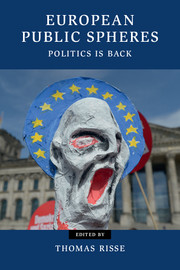Book contents
- Frontmatter
- Contents
- List of figures
- List of tables
- List of contributors
- Preface
- 1 Introduction
- Part I How to grasp the Europeanization of public spheres: theory, methods, empirics
- Part II Consequences: does the Europeanization of public spheres matter?
- Part III Theoretical and normative implications
- 9 Identity, Europe, and the world beyond public spheres
- 10 Democracy, identity, and European public spheres
- Bibliography
- Index
10 - Democracy, identity, and European public spheres
Published online by Cambridge University Press: 05 November 2014
- Frontmatter
- Contents
- List of figures
- List of tables
- List of contributors
- Preface
- 1 Introduction
- Part I How to grasp the Europeanization of public spheres: theory, methods, empirics
- Part II Consequences: does the Europeanization of public spheres matter?
- Part III Theoretical and normative implications
- 9 Identity, Europe, and the world beyond public spheres
- 10 Democracy, identity, and European public spheres
- Bibliography
- Index
Summary
An underlying concern that motivates much normative and empirical research on the Europeanization of public spheres is its crucial importance for democratic decision making. The empirical findings of this book conclude that, indeed, there is evidence of such Europeanization in the form of political contestation about matters European. Several authors point to the present debates surrounding the euro crisis as a particularly illustrative case in point (see Chapter 2). Indeed, the euro debates underscore the need to better understand the intricate conceptual and causal linkages between four different elements of these debates: the nature of these political and quasi-constitutional conflicts; discussions of their causes and solutions in public arenas by elites and citizens; contested democratic standards and ideals; and appeals to the need for a shared European identity, at least for solutions to this and other crises. How should we assess these trends of Europeanization of public spheres? What are their implications for European integration or Euroskepticism, for the prospects of a “European identity,” and for the contours of a more legitimate and democratic European Union (EU)? Specifically, what is the significance for democracy and for the future EU of increased politicization in the sense of contestation in various public spheres among political parties about the European polity and regimes – including the territory and competencies of the EU – as addressed by Risse (see Chapter 6), Pfetsch and Heft (see Chapter 2), and others in this book (see also De Wilde 2011)?
This final chapter considers some of these linkages from the vantage point of democratic theory. Is such contestation about “constitutional” issues as those raised by the euro crisis evidence of regrettable Euroskepticism, which in turn indicates the absence of a European identity (see Chapter 7)? Should a European identity be fostered so as to motivate increased solidarity among EU citizens and their member states – for example, in response to the euro crisis? If so, is such a shared identity best identified as or promoted by a grand project that commands consensus, as European Commission President Barroso recommended (Barroso 2005)? Or is identity better fostered by more contestation?
- Type
- Chapter
- Information
- European Public SpheresPolitics Is Back, pp. 247 - 262Publisher: Cambridge University PressPrint publication year: 2014
- 3
- Cited by

